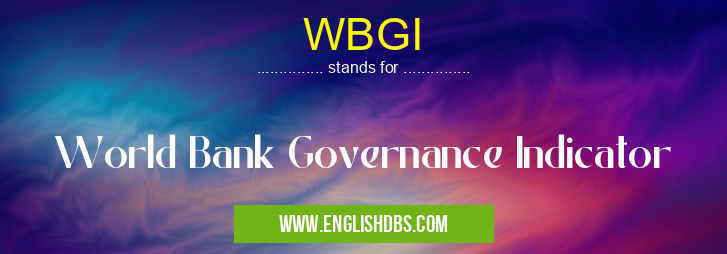What does WBGI mean in BANKING
WBGI (World Bank Governance Indicator) is a widely recognized composite index developed by the World Bank to assess the quality of governance in countries around the world. It measures six dimensions of governance, providing valuable insights into the effectiveness of government institutions and the overall business environment.

WBGI meaning in Banking in Business
WBGI mostly used in an acronym Banking in Category Business that means World Bank Governance Indicator
Shorthand: WBGI,
Full Form: World Bank Governance Indicator
For more information of "World Bank Governance Indicator", see the section below.
Key Dimensions of WBGI
- Voice and Accountability: Reflects the extent to which citizens have the right to participate in political processes and hold their leaders accountable.
- Political Stability and Absence of Violence: Assesses the stability of the political system and the level of violence and political instability.
- Government Effectiveness: Measures the quality of public service delivery, the government's ability to formulate and implement policies, and the level of corruption.
- Regulatory Quality: Evaluates the effectiveness of the legal and regulatory framework, the extent of government interference in the economy, and the protection of property rights.
- Rule of Law: Assesses the fairness and impartiality of the legal system and the protection of property rights.
- Control of Corruption: Measures the extent to which corruption permeates the public sector and influences government decisions.
WBGI Scoring and Interpretation
The WBGI assigns scores ranging from 0 to 100 for each dimension, with higher scores indicating better governance. Countries with high WBGI scores are typically characterized by strong institutions, transparent governance, and a favorable business climate. Conversely, low WBGI scores may indicate weak governance, corruption, and political instability.
Relevance for Businesses
The WBGI is a crucial indicator for businesses when evaluating potential investment opportunities. It provides insights into the political, economic, and legal environment of a country, enabling businesses to make informed decisions about market entry and operations. Countries with high WBGI scores offer a more stable and predictable business environment, which can reduce investment risks and increase the likelihood of success.
Essential Questions and Answers on World Bank Governance Indicator in "BUSINESS»BANKING"
What is the World Bank Governance Indicator (WBGI)?
The WBGI is a set of measures that assess the quality of governance in countries around the world. It is produced by the World Bank and is based on data from a variety of sources, including surveys of businesses and households, as well as data from government agencies. The WBGI measures six dimensions of governance: [1] Voice and Accountability [2] Political Stability and Absence of Violence [3] Government Effectiveness [4] Regulatory Quality [5] Rule of Law [6] Control of Corruption
How is the WBGI used?
The WBGI is used by a variety of stakeholders, including governments, businesses, and civil society organizations, to assess the quality of governance in countries. It is also used by researchers to study the relationship between governance and economic development.
What are the limitations of the WBGI?
The WBGI is a valuable tool for assessing the quality of governance, but it has some limitations. First, the WBGI is based on data from a variety of sources, and the quality of these data can vary. Second, the WBGI measures only six dimensions of governance, and there are other important dimensions of governance that are not measured by the WBGI. Third, the WBGI is not always able to capture the nuances of governance in different countries.
How can I access the WBGI data?
The WBGI data is available on the World Bank's website.
Final Words: The World Bank Governance Indicator (WBGI) is a comprehensive tool for assessing the quality of governance in countries worldwide. By measuring six key dimensions of governance, the WBGI provides businesses and policymakers with valuable information to make informed decisions about investment and development strategies. Understanding the WBGI and its implications can help organizations navigate complex global markets and identify countries with favorable governance conditions that support economic growth and prosperity.
